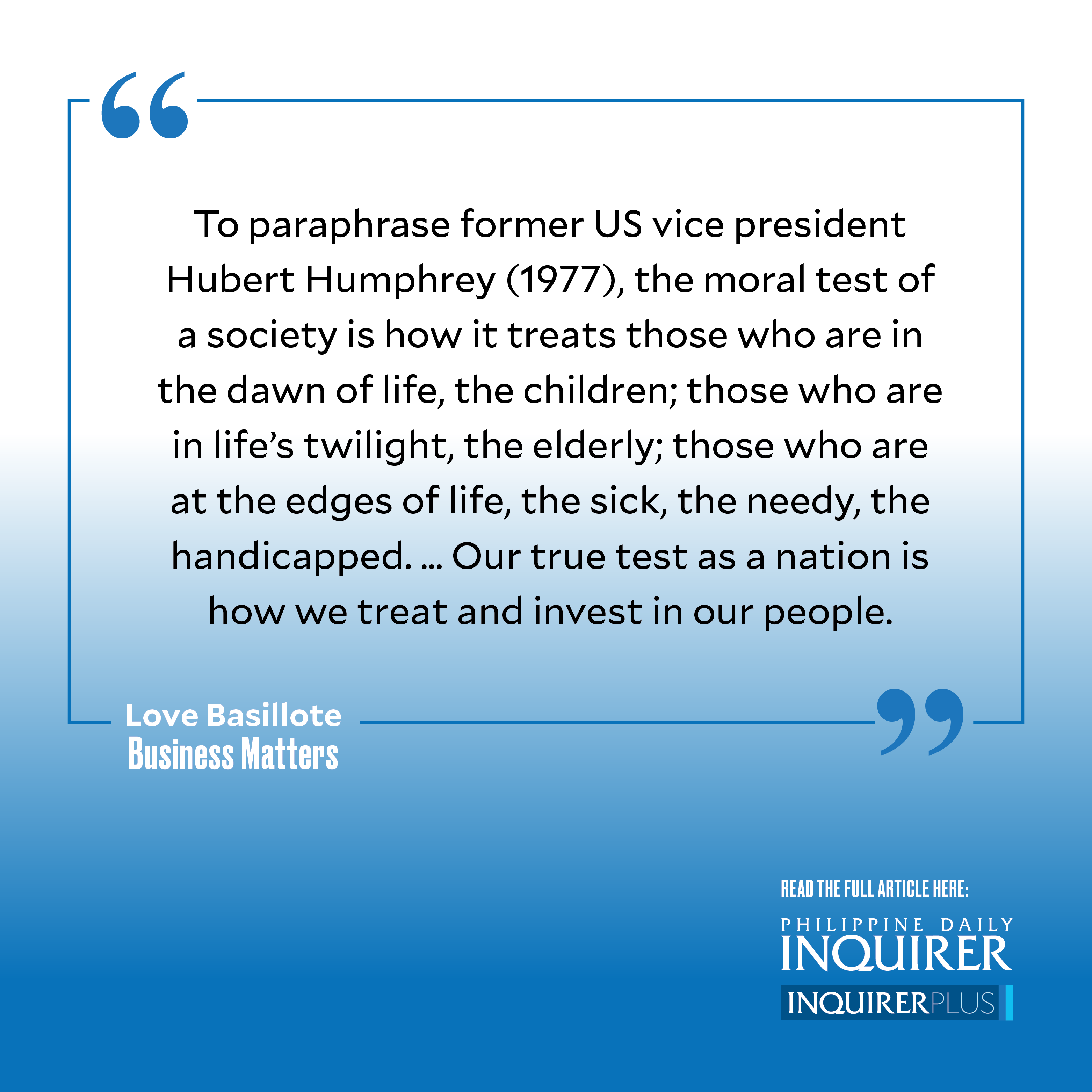The true test we must not fail
Last Saturday, I had the honor of addressing three graduating classes of the University of the Philippines College of Education. One key message I hoped they’d take away from my speech is that human capital development requires doing things very well beyond the level of the individual. It requires a consistently high-performing system that enables people to reach their potential. It is contrary to the tenets of our hyper-individualist society, where exceptionalism has become the go-to explanation of the prosperity of some: S/he succeeded because of his/her own grit and perseverance.
By no means did I get to where I am today, the executive director of one of the country’s leading education policy advocacy groups, solely on my own effort. I believe that I stand on the shoulders of my no-read-no-write paternal grandmother, my struggling parents who gave everything they had so that my siblings and I could go to the good schools, my teachers who gave me mentorship and opportunities, my bosses who provided me professional development, and education leaders who warmly welcomed me to the sector, despite being a granddaughter of an illiterate, a probinsyana, with little social capital. I am where and who I am today because of a human capital development system that has raised the ceiling of my possibilities, as it also raised the floor of my potential.
There are three things I learned in my 10 years of working in education reform that we need to build a human capital development system that delivers on the promise of social mobility and shared prosperity: a cradle-to-grave framework, partnerships, and fit-for-purpose governance.
Where resources are scarce, it is important to prioritize. However, support needs to start the moment a child is born, ensuring good nutrition for both baby and mommy. Investments are needed so that every child has the foundational skills of reading, numeracy, writing, and values so that they are equipped to engage in school, complete basic education, and become good citizens. Lifelong learning opportunities that have built-in wrap-around support and social safety nets should be guaranteed for people to flourish and contribute to national development. I hope that the EdCom II will deliver this framework.
Both public and private sectors have roles to play, precisely because not one single agency or group can do it all. Everyone has something to contribute. Partnerships, where the strengths and resources of each stakeholder are leveraged, should be fostered. The experiences of a sector could form the basis for improved execution, and to widen the reach of societal programs. Mutually beneficial and meaningful partnerships have been the Philippine Business for Education’s secret in its success. Partnerships don’t only improve policy, but, importantly, they touch more lives.
We take pride in our diversity and uniqueness. And yet, many of our efforts tend to be one-size-fits-all. Implications of this include the longest school closures in the world, despite many islands with low COVID-19 case counts and positivity rates. Another is how we pass on human capital development from one agency to another, and in the process, dropping many during transition years. It is high time for us to follow a governance model that is fit for our context, that is guided by data, and is designed by and participated by the people governed: nothing about us without us.
To paraphrase former US vice president Hubert Humphrey (1977), the moral test of a society is how it treats those who are in the dawn of life, the children; those who are in life’s twilight, the elderly; those who are at the edges of life, the sick, the needy, the handicapped. We mustn’t fail the one in three five-year-old children who remain malnourished and not ready to learn. We mustn’t fail 90 percent of our 10-year-olds who cannot read a simple text. We mustn’t fail the millions who remain impoverished for lack of education, employment, and livelihood. We mustn’t fail the elderly, who are increasingly feeling isolated, without adequate pensions and meaningful activities. Our true test as a nation is how we treat and invest in our people.
Yes, time is not on our side. There are also a multitude of global shifts and local complexities that we as a nation need to grapple with as we take this test. However, as I told the UP College of Education’s graduating classes, the future generation (education) leaders, we hope that every Filipino becomes part of a consistently high-performing human capital development system that dreams and invests big for its people. We hope that we build a village that raises every member into able contributors to national development. And while we are all prophets of a future not our own, where we cannot do everything, may that knowledge urge us to act, and do things very well together, as a system, for future generations.
——————
Love Basillote is the outgoing executive director of the Philippine Business for Education, a policy-advocacy group started by the Philippines’ top business leaders, driving education and workforce development reform in the country. This article is based on the speech she gave during the Parangal 2022 of the UP College of Education.
——————
Business Matters is a project of the Makati Business Club (makatibusinessclub@mbc.com.ph).





















